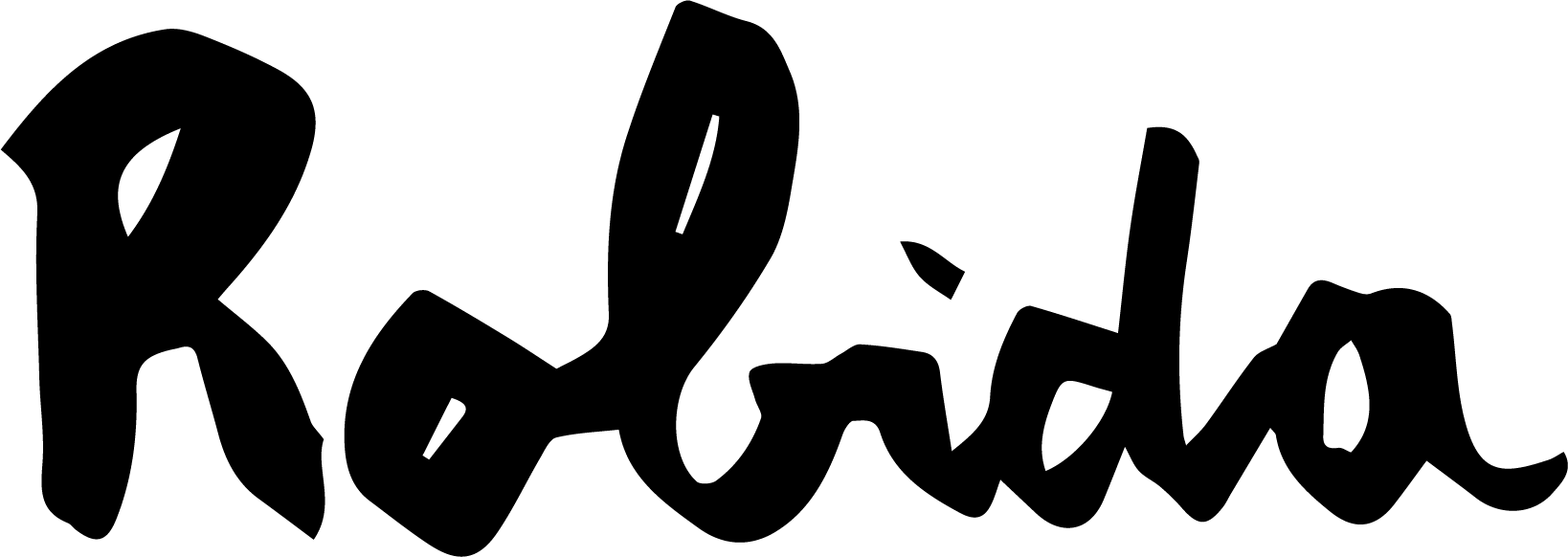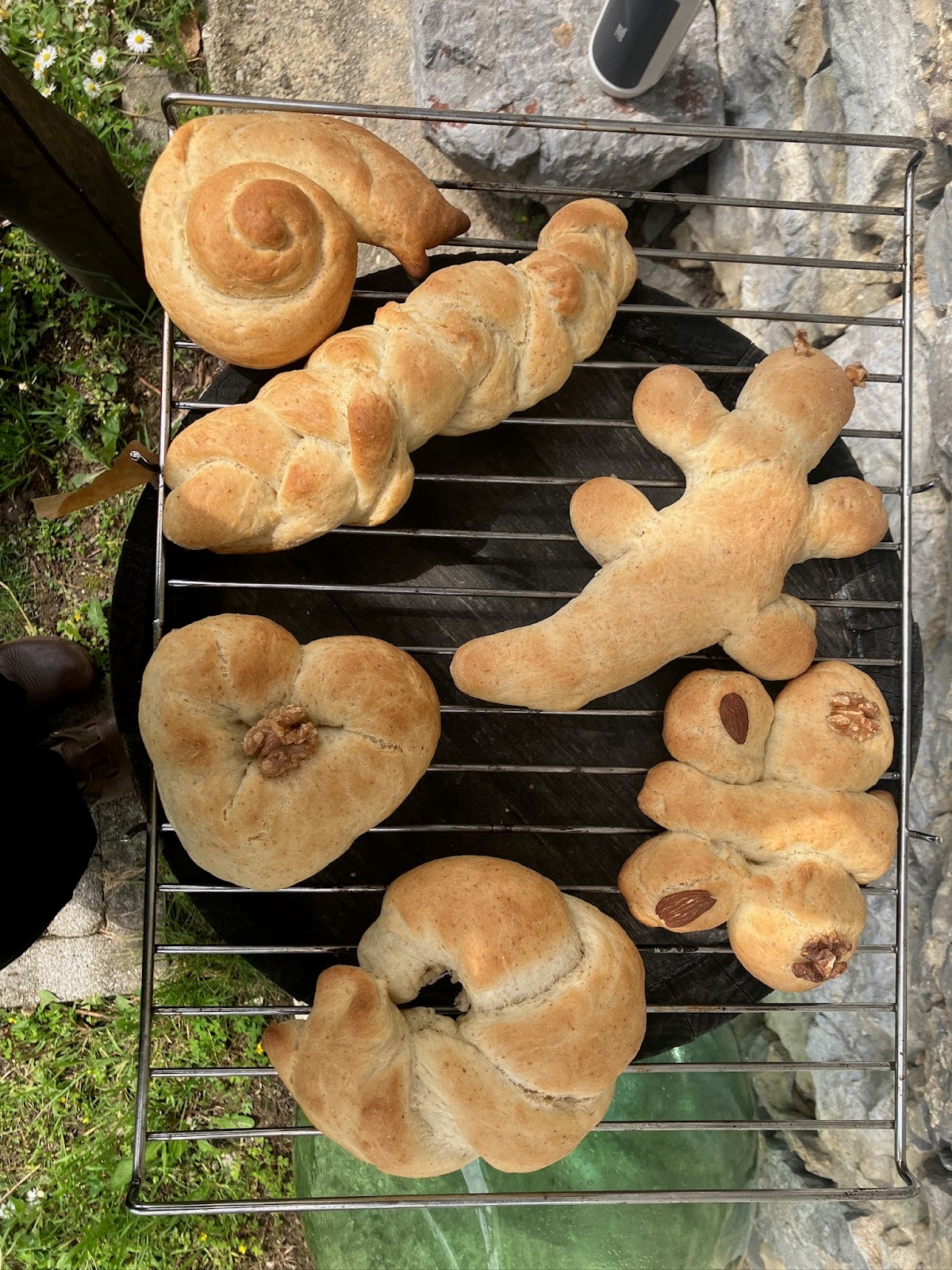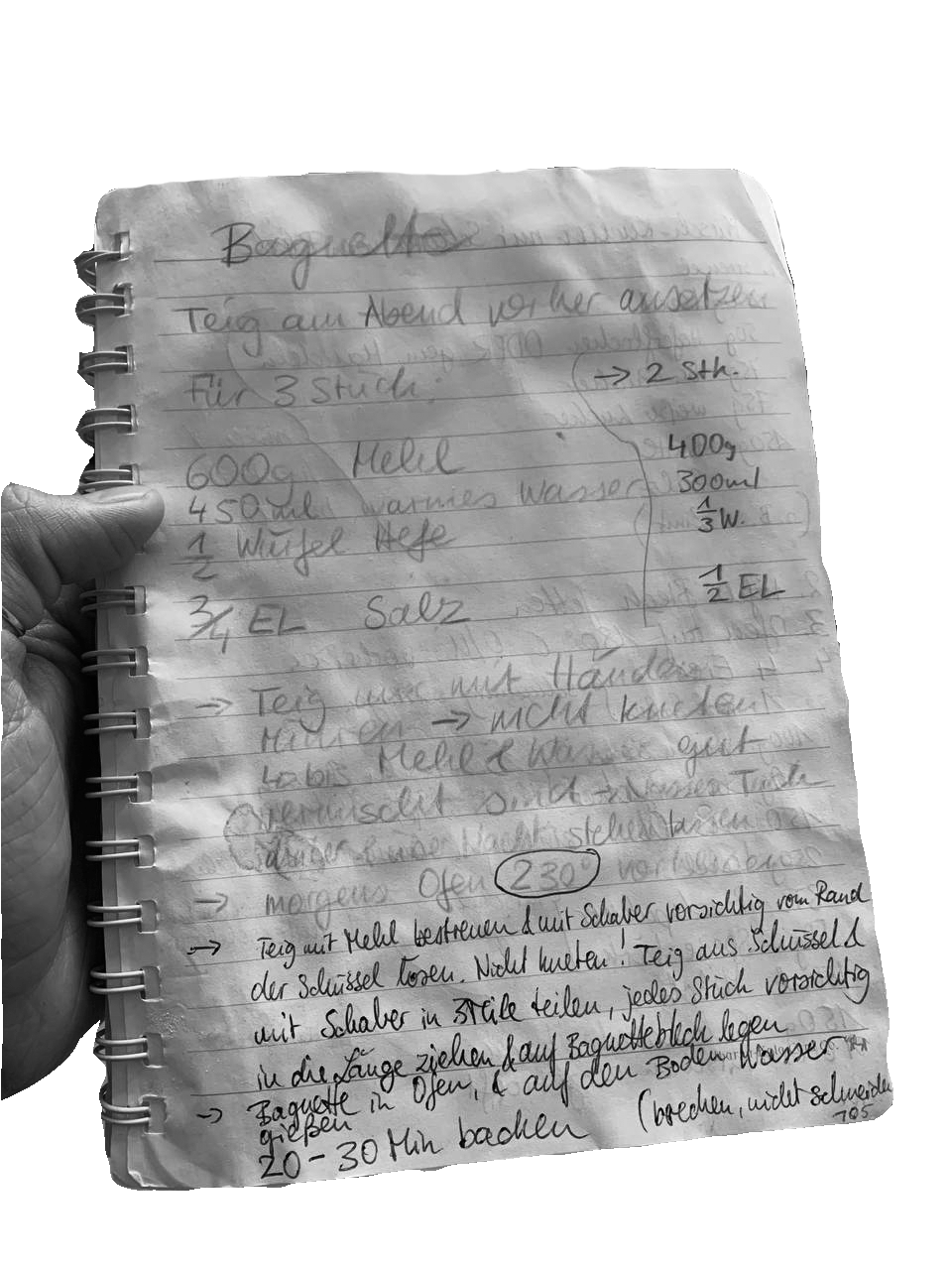When See You Soon Becomes See You Later
Inspired by Robida’s work and the spaces they cultivate—and by the ways our paths had already crossed from afar—we came to Topolò in April 2025 to meet and practice learning with together. Working decentrally between Berlin, Hamburg, and Vienna, it was also a moment for us, as a collective, to cross paths in real life, to pause, to reflect, and to be in process side by side. We also came to forge our Not-Yet—the future we want to commit to and for which we constantly build the groundwork for. The journey was long, and when we arrived in Topolò a steady rain greeted us, slowing each step through the village and our first encounters with Robida.
The ‘we’ in this Journal Text is a ‘we’ that dates back to A New School, A Summer School – (Re)imagining Learning Environments, which we hosted in 2023 with Destina Atasayar and Katharina Brenner. Zest Kollektiv, our decentralized learning group, is rooted in artistic (un)learning and in creating spaces of mutual care—and in doing so, we found our way to Robida. Though geographically distant, our paths crossed in retrospect, at least notionally. We realized how our tightly packed programme of the summer school—rich in external input but short on pause and unplanned exchange—unintentionally echoed the very productivity logic of hierarchical classrooms we aimed to unlearn. This reflection resonated with Robida’s shift from learning from to learning with after their first Academy of Margins in 2022—a turn closely aligned with our own process.
Here in Topolò we learned that when it pours, no one ventures out unless they must; unlike our home cities, where rain is merely weather, in Topolò it sets the tempo. We retreated indoors doing Drinnen-Dinge—cooking, sketching, listening, cutting out, scanning, writing, reading, sharing stories—weaving a sense of Gemütlichkeit. Yet, whenever we braved the rain to forage spring onions or fresh herbs to brighten our meals, we felt the dampness cling softly to our skin. Two days later, the clouds lifted, and we gradually drifted outside; our paths crossing at doorways and winding lanes, with some of these casual encounters carrying little sparks into our discussions later.
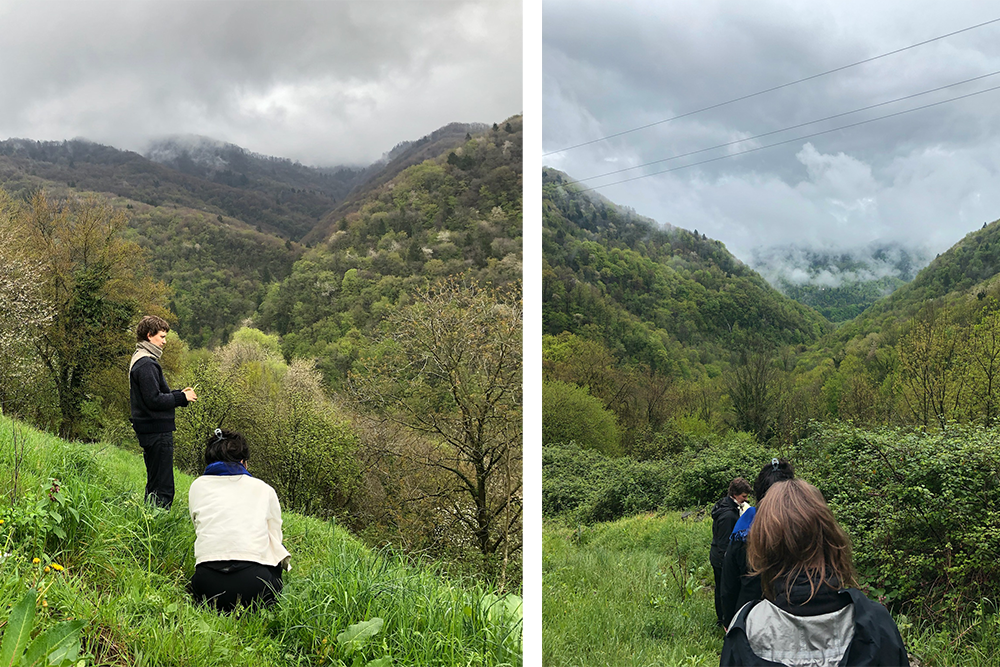
Still the line between outside and inside blurred. We often began meetings outdoors, only to slip back inside whenever the drizzle returned. Still, we carried reminders of the outside—notes blurred from raindrops, cold feet, soggy cookies, small bouquets of flowers and Zecken (ticks) among them. They nestle into warm folds, into the Gemütlichkeit. They like to stay close to the body, to linger, to settle into calm. As the Zest Kollektiv, we share at least one thing with the Zecken: the ‘Z’—bold and zornig (angry), yet layered with countless softer, more nuanced tones.
We spent a lot of time reflecting on the roles of guest and host—before our arrival, during our stay, and now in retrospect—a journey we share with Robida, having often been hosts ourselves. This time, however, we were guests. Mid-reflection, one of us accidentally swapped the words ‘guest’ and ‘host’, revealing how, in communal spaces like IZBA, these roles can overlap and their boundaries soften the longer you stay—the more familiar the place became, the more comfortable we felt. We appreciated the moments when guesting quietly slipped into hosting, and hosting back into guesting—such as when we organized workshops, dinners, and brunches in a place still new to us—which also made us wonder: can one be a guest in a place one knows so well? On the eve of our departure, just as we were growing more familiar with Topolò and its rhythm, we used up our leftovers for a shared meal with Heike, Madalena, Diogo, and Antonio at IZBA. Here, we walked the meandering line between guest and host, enjoying the spontaneity of creating moments of togetherness in Topolò—a place where you can simply knock on someone’s door to share a dinner, rather than checking public transport connections with three changes. Of course, the spontaneity that IZBA and its surroundings allow doesn’t come solely from their geographic location. It is the result of the hospitality that Robida has cultivated over the years through countless gestures of care, preparing the ground for moments of collectivity long before they actually happen. These acts of hospitality show not only interpersonally but also in very practical ways. For example, when the first introduction to IZBA includes being shown where to find the key, allowing everyone to access and use the space independently. Or being told, right after the wood carving workshop ended, where to find the tools—so we could continue carving our wooden spoons and bowls, which felt like they would never be finished. It’s in these seemingly small gestures, where a kind of hospitality resides that creates spaces so welcoming that guests who linger begin to feel like hosts themselves.
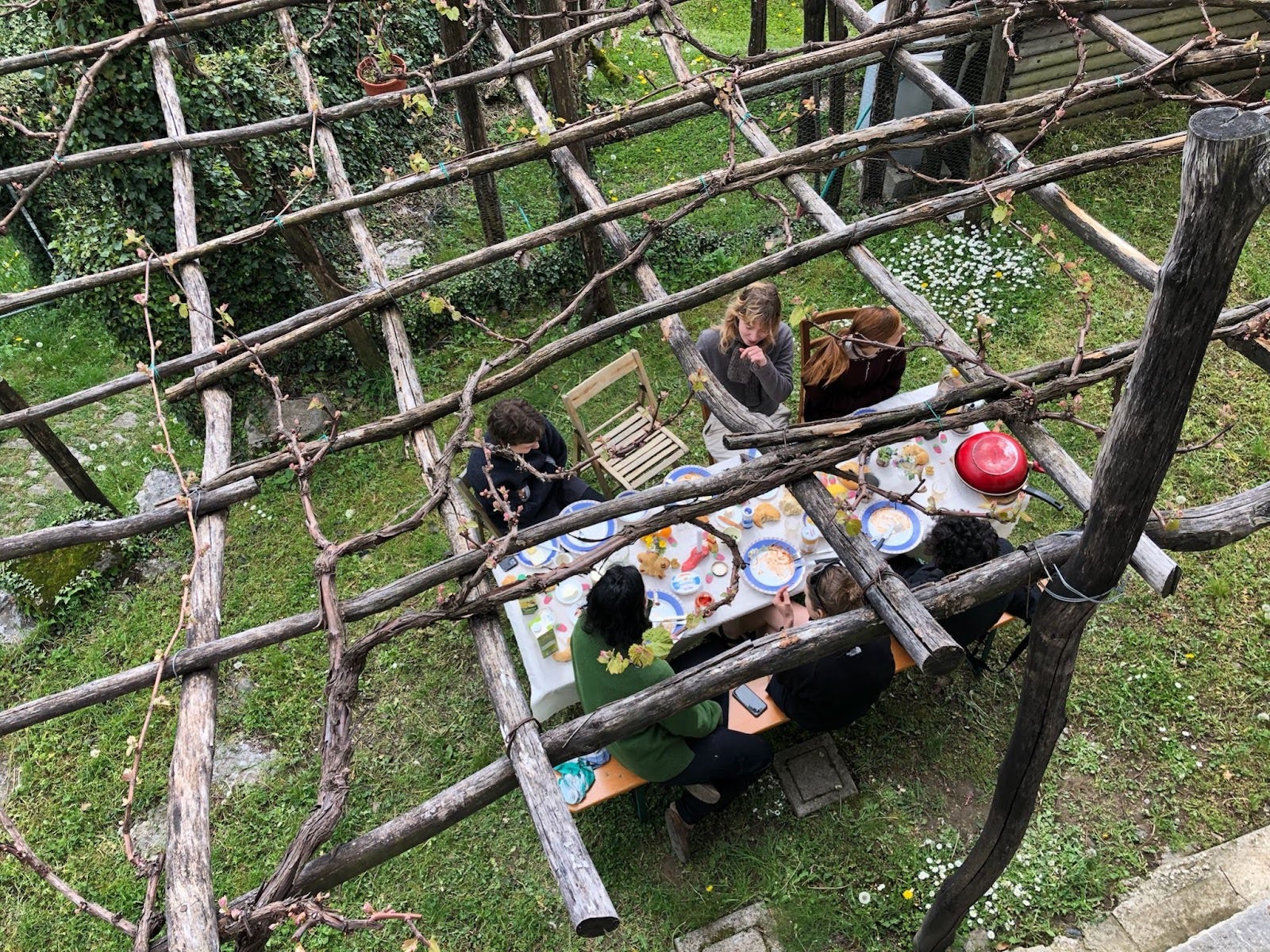
The days in Topolò, surrounded by green hills and accompanied by walks where fire salamanders joined us, brought focus and calm for reflection—but they also had us slipping on rain-slick stones, reaching for the walls of the houses to regain balance (sometimes succeeding, sometimes not). Even with our daily lives on pause—or perhaps because of it—we encountered the lingering effects on our minds and bodies. As we planned to practice learning with, we inevitably encountered some less comfortable ‘withs’ as well. Whether we wanted to or not, we also learned with discomfort, with unclear futures, with unfinished business and with viscous grounds among us. In The Undercommons – fugitive Planning & Black Study Fred Moten and Stefano Harney write about learnings outside of hierarchical classrooms. They remind us that each moment and activity spent together, even in chaos, produce knowledge and can be recognized as chances to learn, they give access to a whole and varied history of thought.
“Study, Fred Moten and Stefano Harney argue, is about creating dissonance. It’s about allowing learning to continue, rather than continuously cutting learning off in the name of what we’ve decided, in advance of our coming together, is worthy of being called knowledge. Don’t look too hard for the through-thread. Don’t worry too much about drawing a line. Make learning a weave.” (Propositions for a Radical Pedagogy, or How to Rethink Value by Erin Manning )
During our stay, two of us baked bread using the same recipe. While Lotte’s bread contained just shy of ¾ teaspoon of salt, a few days later we found ourselves eating Lioba’s version—with an ambitious 4 tablespoons. ¾ teaspoons, 3–4 tablespoons—every recipe is Interpretationssache. Each ingredient comes with an invitation to adjust it to the circumstances. So if you want to casually spark a conversation about being in love at the dinner table, like Lioba did that night, you might simply add a bit more salt, as a German saying advises.
Moments like these serve as gentle, sometimes salty reminders of an undeniable yet surprising (and often challenging) truth in processes of collective learning: that there is never just one way to read a situation, a text, or an abbreviation. Reading is always a dialogue, it contains multitudes. Adaptations, misunderstandings, and confusions are always included.
Being in Topolò as a collective felt like a spacious unfolding compared to our usual brief 1.5-hour weekly meetings, which suddenly expanded into a full 168 hours. Time stretched and shifted — lunches slipped by unnoticed, plans settled and rearranged with ease, and the simple farewell “see you soon” gently transformed into “see you later”, then into “in a bit” — with that “later” sometimes arriving sooner than expected, as our paths crossed again while searching for our preferred spot to make a phone call. Here, we were no longer just heads and upper bodies speaking through screens, but whole bodies in motion—exchanging ideas about possible futures for our collective work while literally carrying stones uphill from the riverbed, needed to build the foundation of the relational platform Log, created by Diogo, Madalena, and Antonio. It is in these moments—where thinking and doing intertwine and transform each other unexpectedly—that we experienced a deeper kind of learning. Perhaps the Zecke that somehow managed to hide unnoticed in a fold of Lotte’s skin and hitch a ride all the way to Hamburg can serve as a gentle reminder that our paths will keep crossing. Even if we’re no longer in the same place, a part of us remains in Topolò, just as a part of Robida has traveled with us to Vienna, Hamburg, and Berlin—like that persistent Zecke, reminding us of the things we didn’t get to do together:
→ How to crochet a pot holder
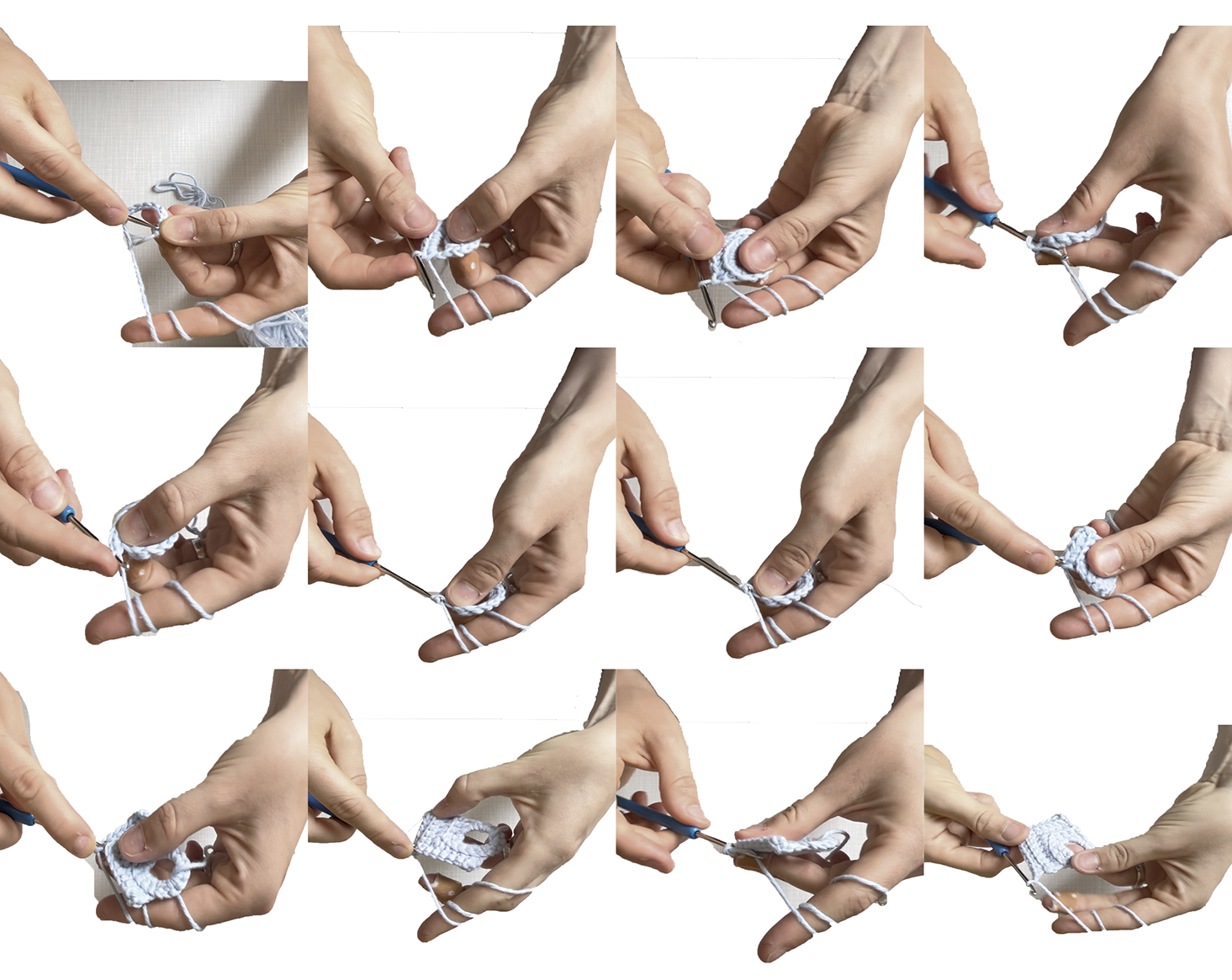
Lioba: “There’s a meaningful difference in showing and teaching each other when we’re sharing the same space, which is why this instruction can only take one so far.”
Literature:
Imarisha, Walidah. 2021. “Living the Not-Yet.” Conversation with Jeanne van Heeswijk and Rachael Rakes.
Manning, Erin. 2019. Propositions for a Radical Pedagogy, or How to Rethink Value.
Moten, Fred, and Stefano Harney. 2013. The Undercommons: Fugitive Planning & Black Study.
